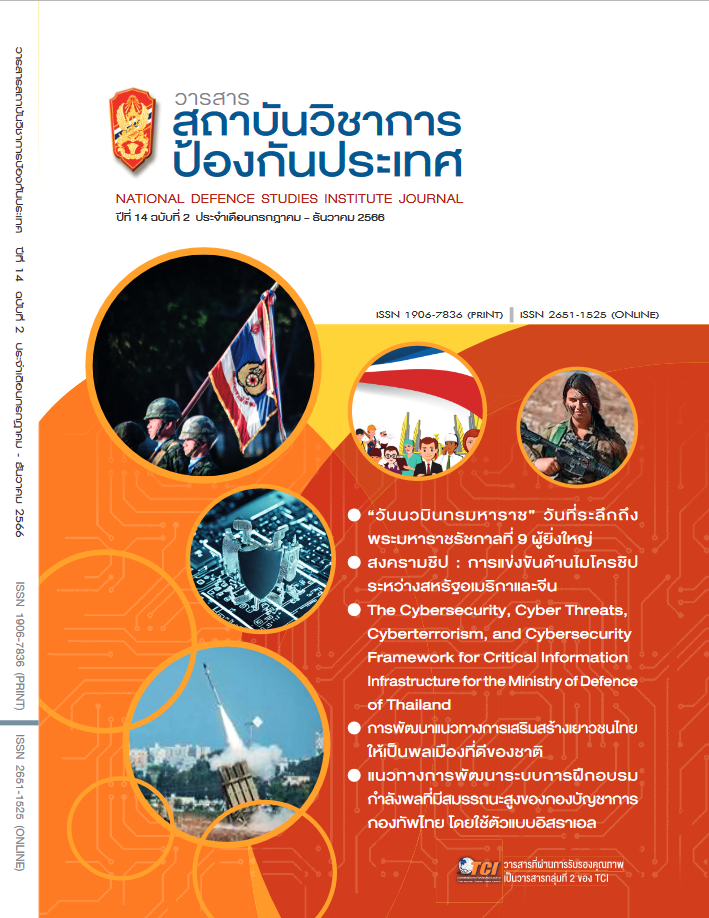The Development of Guidelines for Enhancing Thai Youths for Being Good Citizenship of The Nation
Main Article Content
Abstract
The objectives of this study are to: 1) examine Thai youth attitudes towards being good citizens of the Nation; 2) identify the driving force that influence Thai youth attitudes towards being good citizens of the Nation; and 3) provide recommendations for improving Thai youth attitudes towards being good citizens of the Nation. The study methods consist of three steps as follows. Step 1: Conducted a survey of Thai youth attitudes using Google Form questionnaires with the heading “Thai youth attitudes towards being good citizens of the Nation.” The data was collected from 399 samples with ages ranging from 15 to 25. Step 2: Convened a workshop with 10 educational specialists to discuss the driving forces that influence Thai youth attitudes. Step 3: Tried out activities (Sandbox) on 30 youth in Chiang Mai as samples. The data was analyzed using frequencies percentages and content analysis.
The findings were as follows: 1) Thai youth attitudes towards being good citizens of the Nation in terms of individual aspect showed the highest degree of strongly agreed in all items. The element of Thai youth attitudes towards other people, society and the Nation, the item of the loyalty to the Nation, Religion, and the Monarchy, and the item of the participation in the democratic form of government with the king as head of state, showed the highest level of uncertainty agreed. 2) “Nationalism” is a major driving force that influence Thai youth attitudes towards being good citizens of the Nation. 3) A guideline for enhancing Thai youth to become good citizens of the nation included following four steps: 1) developing an understanding of the current social context, 2) fostering self-esteem and pride in one’s community and country, 3) establishing a shared expectation and 4) cooperating in urban development
Article Details

This work is licensed under a Creative Commons Attribution-NonCommercial-NoDerivatives 4.0 International License.
The articles, images, tables, graphs, written content, and opinions published in this journal are solely those of the authors and do not necessarily reflect the views or positions of the National Defence Studies Institute or its academic affiliates.
References
กาญจนา นาคสกุล. (ม.ป.ป.). พระบรมราโชบายด้านการศึกษา ของสมเด็จพระเจ้าอยู่หัวรัชกาลที่ 10. สืบค้นเมื่อ 18 มิถุนายน 2566, จาก https://www.attth.org/พระบรมราโชบายการศึกษา/
เกษม วัฒนชัย. (ม.ป.ป.). พระบรมราโชบายด้านการศึกษา ในหลวงรัชกาลที่ 10. (อัดสำเนา).
แก้วตา ปานมงคล, (2561, 18 เมษายน). อาหรับสปริง ถึง “วิกฤตซีเรีย” สู่ความหวาดหวั่น “สงครามโลกครั้งที่ 3”. M Thai. สืบค้นเมื่อ 21 มิถุนายน 2566, จาก https://news.mthai.com/webmaster-talk/news-focus/634180.html
จิราภรณ์ การะเกตุ. (2563). ประเทศไทยกับสังคมผู้สูงอายุ. สืบค้นเมื่อ 21 มิถุนายน 2566, จาก https://il.mahidol.ac.th/th/i-Learning-Clinic/general-articles/ประเทศไทยกับสังคมผู้สูง
ชวนรู้จัก 'ฮ่องกงโมเดล' คืออะไร ทำไมถูกนำมาเปรียบเทียบกับม็อบไทย. (2563, 17 ตุลาคม). Khaosod Online. สืบค้นเมื่อ 18 มิถุนายน 2566, จาก https://www.khaosod.co.th/politics/news_5125000
บีนา กุตติพารามบิล. (2563). พัฒนาเยาวชนให้พร้อมรับมือกับอนาคตได้อย่างมั่นใจ. สืบค้นเมื่อ 2 กรกฎาคม 2566, จาก https://www.unicef.org/thailand/th/stories/พัฒนาเยาวชนให้พร้อมรับมือกับอนาคตได้อย่างมั่นใจ
ศิวพล ชมภูพันธุ์. (ม.ป.ป.). การถดถอยของประชาธิปไตยและระบอบการปกครองแบบผสม. (อัดสำเนา).
สถาบันวิชาการป้องกันประเทศ, ศูนย์ศึกษายุทธศาสตร์. (2563). การประชุมเสวนาอุปนิสัยกับพฤติกรรมของเยาวชนที่น่าสนใจในปัจจุบัน. (อัดสำเนา).
สำนักงานปลัดกระทรวงศึกษาธิการ, สำนักงานศึกษาธิการภาค 17. (2562). รายงานผลการดำเนินโครงการส่งเสริมสนับสนุนการดำเนินงานตามพระบรมราโชบายด้านการศึกษาของพระบาทสมเด็จพระวชิรเกล้าเจ้าอยู่หัว รัชกาลที่ 10 สู่การปฏิบัติ. (อัดสำเนา).
สุรชาติ บำรุงสุข. (2563). ฤดูใบไม้ผลิ! : คลื่นการเมืองจากอาหรับสู่ฮ่องกง The Spring! : Political Wave from Arub to Hong Kong. กรุงเทพฯ : บริษัท สแควร์ ปริ๊นซ์ 93 จำกัด.


